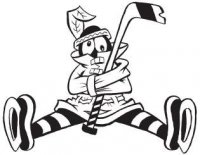The body of newly-signed Winnipeg Jets forward Rick Rypien was found on Monday night. While no official cause of death has been found, there have been strong whispers that it was a case of suicide, closely tied to Rypien's longtime bouts with depression.
Whatever it is, it's tremendously sad. It always is when a 27 year-old dies, especially one in the peak physical condition that Rypien would have had to be in.
Notice I didn't mention his mental condition. Rypien took time out from the Canucks last year due to personal problems, related to his dealings with his own case of depression.
It would be just too much to bear if these got the better of him, but these are such nasty and complicated things to deal with, it's hard to say that. Every case of depression and mental illness is different, its triggers and symptoms and causes depending on that individual.
This is the second death of a "fighter" this summer, following Derek Boogard's drug overdose in June. And what it's going to lead to is a lot of discussion, and a lot of misguided discussion, about the role and toll on the enforcers of this league.
Let's be honest, it's not only the fighters and goons in the NHL who suffer from mental problems. We can be sure of that. But we hear about it more often, don't we? And they seem to be more acute.
Bob Probert was another recent death, in part caused by a drug addiction. Was that addiction a cause of, or a way to deal with, his role of dropping the gloves on a nightly basis? You can't prove it, but you can certainly argue it. Boogard's? Same thing. I wrote a piece earlier this summer about the anxiety John Scott feels sometimes about his role, and how jarring it was.
Another issue to deal with is how Rypien's mental problems were potentially worsened by being punched in the head repeatedly. We know what chronic traumatic encephalopathy -- CTE -- has done to former football players, as we need look no further than Bears legend Dave Duerson, who killed himself because of the problems he was having as his brain was deteriorating.
Again, I don't know that Rypien would be alive today or not if he wasn't getting in fights all the time. But I can ask the question.
What happens now? I wonder if the deaths of Boogard and Rypien won't make the role of "the enforcer" even more distasteful to hockey fans. Will it lead to a ban on fighting? I doubt it. But it should see a real focus on the scripted fight between teams' hired goons.
What purpose did they serve, and now what price are they asking? The answer may just come back they serve no purpose, and they ask too high a price to entertain an ever dwindling percentage of hockey fans.
Maybe if fighting is only a small part of your game, you don't agonize over it. But when it's your only path to your dream? It's clearly a heavy load to deal with.
It seems callous to tell some people they can't achieve their dream of playing in the NHL. Rypien, Boogard, Scott, and a host of others wouldn't be there if they couldn't be pugilists. I don't know what else they'd do if they didn't play hockey. And there are plenty of guys who filled that role who are leading happy lives right now. Stu Grimson comes to mind, as do pretty much the entire 70's Flyers.
But this is happening far too often to not take a look at.
Maybe we'll deny them their dreams. But we might save their lives as well.

Sam Fels is the proprietor of The Committed Indian, an unofficial program for the Blackhawks. You may have seen him hocking the magazine outside the United Center at Gate 3. The program is also available for purchase online. Fels is a lifelong 'Hawks fan and he also writes for Second City Hockey .

